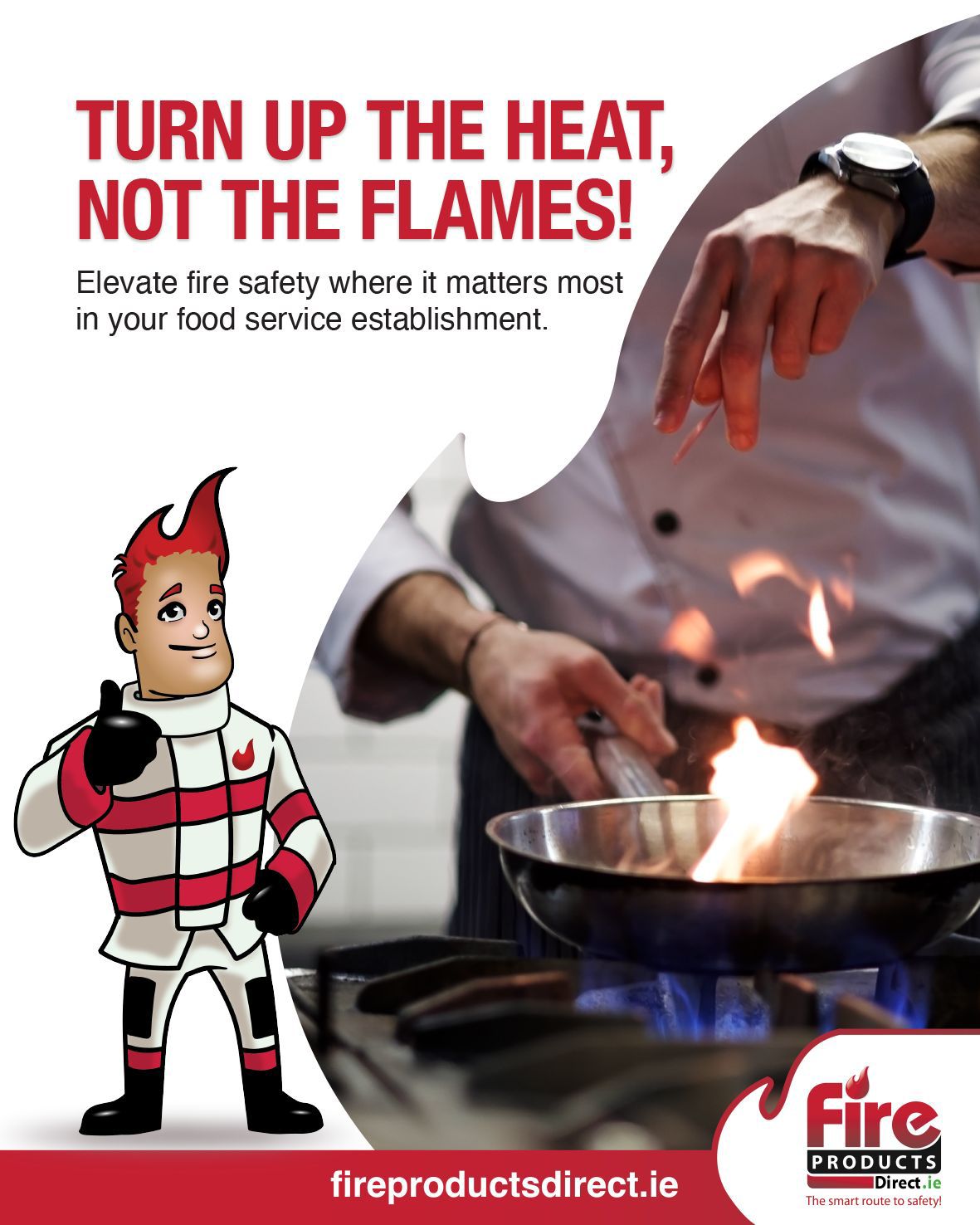
Ensuring fire safety in your café, deli, restaurant or commercial kitchen is crucial for protecting your staff, customers, and property. Regular maintenance and adherence to fire safety regulations are essential components of effective fire safety management. Here’s a comprehensive guide tailored for food service businesses in Ireland.
Key Fire Hazards in Food Service Establishments
- Grease Accumulation: Cooking processes often produce grease, which can accumulate on kitchen surfaces, hoods, and ducts. This buildup is highly flammable and can lead to rapid fire spread if not regularly cleaned.
- Faulty Cooking Equipment: Malfunctioning or poorly maintained appliances, such as fryers, ovens, and grills, can overheat or produce sparks, increasing fire risk.
- Electrical Hazards: Overloaded circuits, damaged wiring, or improper use of electrical equipment can cause electrical fires.
- Improper Storage of Flammable Materials: Storing flammable cleaning agents or paper products near heat sources can inadvertently fuel a fire.
Fire Safety Maintenance Practices
- Regular Cleaning: Implement a strict cleaning schedule to remove grease from kitchen surfaces, hoods, filters, and ducts. It is important to maintain exhaust systems correctly to prevent grease fires.
- Equipment Inspection: Regularly inspect and service all cooking and electrical equipment to ensure they are in proper working order. Address any signs of wear or malfunction promptly.
- Electrical Safety: Ensure that electrical systems are up to code, avoid overloading outlets, and replace damaged cords or wiring immediately.
- Safe Storage Practices: Store flammable materials away from heat sources and ensure that storage areas are organized to prevent accidental ignition.
Regulatory Compliance in Ireland
In Ireland, the Fire Services Act 1981 & 2003 mandates that owners and occupiers of premises maintain adequate fire safety standards to safeguard occupants. This includes implementing necessary fire safety measures and procedures.
Additionally, the Safety, Health and Welfare at Work (General Application) Regulations 2007 outline specific fire safety requirements, such as:
- Regulation 11: Doors and gates
- Regulation 12: Emergency routes and exits
- Regulation 13: Fire detection and firefighting
- Regulation 18: Cleanliness and prevention of waste accumulation
- Regulation 25: Considerations for employees with disabilities
These regulations require businesses to have appropriate fire detection systems, maintain clear emergency exits, and ensure that firefighting equipment is accessible and functional.
Essential Fire Safety Equipment
To enhance fire safety in your establishment, ensure the following equipment is present and maintained:
- Fire Extinguishers: Ensure you have appropriate fire extinguishers in key locations including access to a Class F Wet Chemical fire extinguisher where you have the risk of cooking oil fires. In addition to your monthly checks, portable fire extinguishers should be inspected at least annually by a competent person and in accordance with Irish Standard 291.
- Fire Suppression Systems: Install automatic fire suppression systems in high-risk areas like kitchens to quickly address fires at their source.
- Smoke Detectors and Alarms: Ensure that a Fire Detection and Alarm system is installed throughout the premises and that the system is serviced and maintained in accordance with Irish Standard 3218.
- Emergency Lighting and Signage: Maintain clear signage for emergency exits and ensure that emergency lighting is operational to guide occupants during evacuations. Lighting should be inspected and maintained in accordance with Irish Standard 3217.
Employee Training and Preparedness
Sections 8, 9 and 10 of the HSA Guide to the Safety, Health and Welfare at Work Act 2005 states that businesses must provide sufficient information, training and supervision to employees to ensure their safety.
- Fire Safety Training: Regularly train staff on fire prevention, proper equipment use, and emergency response procedures.
- Emergency Drills: Conduct regular fire drills to familiarise employees with evacuation routes and procedures.
- Accessible Emergency Plans: Display clear emergency plans and ensure all staff are aware of their roles during an emergency.
Maintaining rigorous fire safety standards in your café or restaurant is not only a legal obligation but also a critical aspect of ensuring the safety of your staff and patrons. Regular maintenance, adherence to regulations, and proper training are key components of an effective fire safety management plan.
For high-quality fire safety products tailored to the needs of food service businesses in Ireland, consider exploring the range offered by Fire Products Direct.
Further resources available at:
Be Smart. Be Prepared. Be Safe.







